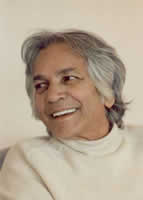U. G. Krishnamurti
U. G. Krishnamurti (9 July 1918 – 22 March 2007), often referred to as U.G., was a thinker and speaker who questioned the value of the search for enlightenment and the nature of spirituality. Despite sharing a name, he had no relation to Jiddu Krishnamurti, another prominent speaker on spiritual matters, though their lives and teachings occasionally intersected.
Early Life[edit | edit source]
U.G. Krishnamurti was born in Machilipatnam, Andhra Pradesh, India, into a Brahmin family. From an early age, he was deeply influenced by the teachings of the Bhagavad Gita and other spiritual texts, which were part of his upbringing. His quest for enlightenment began in his teenage years, leading him to meet and engage with several spiritual teachers, including the renowned Swami Sivananda.
Philosophy[edit | edit source]
U.G. Krishnamurti's philosophy can be challenging to categorize, as it fundamentally denies the validity of any spiritual or philosophical system. He often referred to his state of being as the "natural state," arguing that the pursuit of enlightenment or spiritual transformation is a futile endeavor, bound by the limitations of thought and the structures of society. His teachings emphasize the dismissal of conventional wisdom and the exploration of life free from the constraints of traditional spiritual pursuits.
The Natural State[edit | edit source]
The concept of the "natural state" is central to U.G.'s teachings. He describes this state as a condition of being that is beyond the dualities of happiness and suffering, knowledge and ignorance. According to U.G., this state is not something to be achieved or attained through effort or practice but is the underlying condition of all human beings, obscured by the mind's activities and societal conditioning.
Critique of Traditional Spirituality[edit | edit source]
U.G. Krishnamurti was known for his vehement critique of traditional spiritual and religious practices. He argued that the promises of these systems are illusory and that they only serve to perpetuate the individual's sense of lack and separation. His views challenge the foundations of many spiritual traditions, including Hinduism, Buddhism, and New Age movements, suggesting instead that freedom comes from the cessation of the search for liberation.
Legacy[edit | edit source]
U.G. Krishnamurti left behind a legacy that continues to intrigue and challenge individuals interested in questions of spirituality and enlightenment. His talks and dialogues have been compiled into several books and recordings, maintaining a following among those who resonate with his radical perspective. Despite his critique of spiritual systems, U.G.'s insights into the nature of human consciousness and the pitfalls of spiritual seeking have contributed to contemporary discussions on non-duality and the nature of the self.
Selected Works[edit | edit source]
Some of U.G. Krishnamurti's notable works include:
- The Mystique of Enlightenment
- Mind is a Myth
- The Natural State in the Words of U.G. Krishnamurti
See Also[edit | edit source]
This article is a philosophy-related stub. You can help WikiMD by expanding it!
Search WikiMD
Ad.Tired of being Overweight? Try W8MD's physician weight loss program.
Semaglutide (Ozempic / Wegovy and Tirzepatide (Mounjaro / Zepbound) available.
Advertise on WikiMD
|
WikiMD's Wellness Encyclopedia |
| Let Food Be Thy Medicine Medicine Thy Food - Hippocrates |
Translate this page: - East Asian
中文,
日本,
한국어,
South Asian
हिन्दी,
தமிழ்,
తెలుగు,
Urdu,
ಕನ್ನಡ,
Southeast Asian
Indonesian,
Vietnamese,
Thai,
မြန်မာဘာသာ,
বাংলা
European
español,
Deutsch,
français,
Greek,
português do Brasil,
polski,
română,
русский,
Nederlands,
norsk,
svenska,
suomi,
Italian
Middle Eastern & African
عربى,
Turkish,
Persian,
Hebrew,
Afrikaans,
isiZulu,
Kiswahili,
Other
Bulgarian,
Hungarian,
Czech,
Swedish,
മലയാളം,
मराठी,
ਪੰਜਾਬੀ,
ગુજરાતી,
Portuguese,
Ukrainian
Medical Disclaimer: WikiMD is not a substitute for professional medical advice. The information on WikiMD is provided as an information resource only, may be incorrect, outdated or misleading, and is not to be used or relied on for any diagnostic or treatment purposes. Please consult your health care provider before making any healthcare decisions or for guidance about a specific medical condition. WikiMD expressly disclaims responsibility, and shall have no liability, for any damages, loss, injury, or liability whatsoever suffered as a result of your reliance on the information contained in this site. By visiting this site you agree to the foregoing terms and conditions, which may from time to time be changed or supplemented by WikiMD. If you do not agree to the foregoing terms and conditions, you should not enter or use this site. See full disclaimer.
Credits:Most images are courtesy of Wikimedia commons, and templates, categories Wikipedia, licensed under CC BY SA or similar.
Contributors: Prab R. Tumpati, MD

